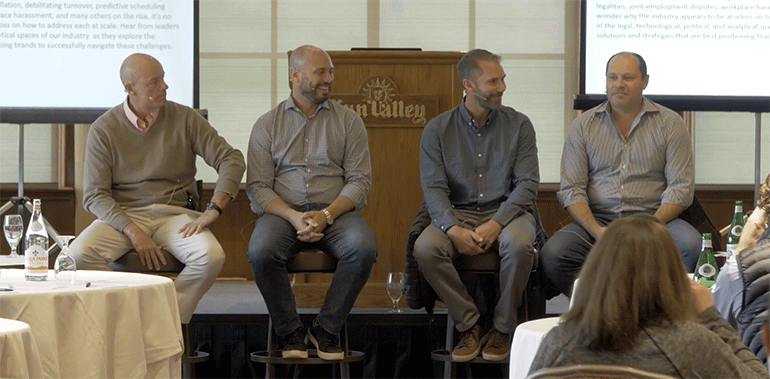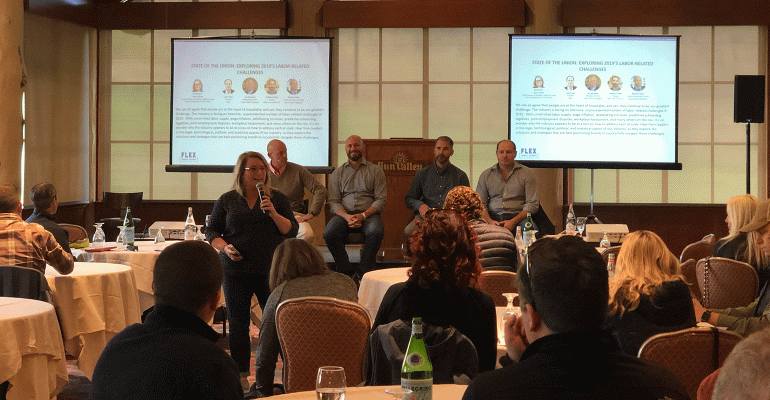The restaurant industry is facing a number of labor challenges in the next few years, but one of the biggest could be being out of touch with its workforce, according to panelists at the recent Financial Leadership Exchange.
“There’s a growing kind of political isolation of our industry,” said Joe Kefauver, managing partner at Align Public Strategies.
“When I was at Darden 20-plus years ago lobbying issues, most of our business model, our P&L issues with labor, wages, benefits, all that kind of stuff, we had a lot of allies when we would address policy makers,” Kefauver said.
He added that those allies included representatives of convenience stores, drug stores, groceries and hotels.
While other retailers have expanded benefit packages and deployed predictive scheduling, Kefauver said, the restaurant industry has been slow in adopting those tools.
“What’s happened is that as these issues have played out at the federal level, the state level, the local level, we are more and more alone arguing the issue,” he said. Trade associations, for example, “are less likely to  help inoculate you from those.”
help inoculate you from those.”
Kefauver shared his outlook on workforce challenges in a “State of the Union: Exploring 2019’s Labor-Related Challenges” panel Sept. 17 at the Revelry Group’s Financial Leadership EXchange (FLEX) in Sun Valley, Idaho.
Other participants in the panel moderated by Sarah Lockyer, restaurant and food group publisher for Informa, included: Michael Halen, senior restaurant analyst with the Bloomberg Intelligence research firm; Anthony Zaller, employment law attorney with Zaller Law Group P.C.; and Luke Fryer, founder and CEO of Harri, the hospitality workforce management platform.
Related to the political isolation is a growing demographic divide in the industry, Kefauver said, with the line workforce headed toward majority minority.
“The top of our restaurant companies does not look like that,” he noted. “There’s a continuing divide about what the leadership of our industry looks like and what the workers of our industry look like. It doesn’t work for a lot of reasons.”
He noted companies like Google and Wayfair had come under political pressure from their workforce.
Zaller said he advises his clients engage and communicate with vendors, employees and politicians even if they don’t agree on the issues.
“Even if you don’t agree with where it’s going, at least have some input,” he told the group that included a number of chief financial officers.
“As CFOs, you have the information on how this will affect your company.”
Such information could include data on the number of new jobs brought to an area for a new location of a brand, Zaller said. “You have a lot of information that needs to be shared outside your company,” he said.
Halen said companies with missions in areas such as charitable giving, food quality and sustainability, including such publicly traded companies as Shake Shack Inc. and Chipotle Inc., are finding it easier to draw in customers.
“Younger generations want to be associated with brands that are doing right by the planet and the population,” he said.
Fryer of Harri said the employee experience, which is linked to retention, correlates closely to the guest experience.
“You need stable teams to provide consistent product, service and brand experience,” Fryer said, adding that turnover needs to be monitored on a monthly basis to provide the best benchmarks.
Fryer said Harri surveys found that 65% of workers were leaving limited-service jobs in the first 90 days of employment because they were unsatisfied with scheduling.
Some states are considering legislation to require predictive scheduling, which is sometimes called Fair Workweek rules. Zaller said he prefers to call it “restrictive scheduling,” because the rules would require employers to publish schedules in advance.
California has proposed legislation, yet unpassed, requiring work schedules to be published 21 days in advance, Zaller said, and employer violators would be punished. New York passed scheduling rules on retailers, including restaurants, depending on number of employees.
“Employers … need to get in front of this discussion now,” Zaller said, suggesting they start talking to workers about the flexibility of restaurant jobs, which draw many to the industry.
Kefauver noted that the New York City Department of Consumer and Worker Protection filed a lawsuit in September seeking $1 million from Chipotle, including restitution for workers, for violating the city Fair Workweek law requiring employers to give staff a two-week advance notice of their work schedules and to pay premiums for last-minute re-scheduling.
Workers from at least five New York City-area Chipotle units file complaints and joined in protests over scheduling later in the month.
Zaller said restaurant operators can lean on technology to help manage compliance with the new scheduling laws.
A starting point for operators, Zaller noted, is getting employee information digitized so its easily accessible and “having processes in place so information is easy to pull.”
Halen added that “technology is really going to be the answer in the long term” both in workforce management and the reduction in labor hours. He cited Chili’s Grill & Bar and other casual-dining brands moving to server handheld technology as well as kiosks and mobile ordering in quick-service brands.
Contact Ron Ruggless at [email protected]
Follow him on Twitter: @RonRuggless





